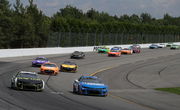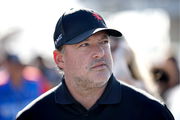
via Imago
Bildnummer: 09509256 Datum: 20.01.2012 Copyright: imago/Icon SMI JAN 20, 2012: Mike Joy during the NASCAR Motorsport USA Hall Of Fame Inductions. NASCAR Motorsport USA JAN 20 Hall Of Fame Inductions – Class Of 2012 PUBLICATIONxINxGERxSUIxAUTxHUNxRUSxSWExNORxONLY Icon201201200181; x0x xng 2012 quer Image number 09509256 date 20 01 2012 Copyright imago Icon Smi Jan 20 2012 Mike Joy during The Nascar motor aviation USA Hall of Fame Inductions Nascar motor aviation USA Jan 20 Hall of Fame Inductions Class of 2012 PUBLICATIONxINxGERxSUIxAUTxHUNxRUSxSWExNORxONLY x0x 2012 horizontal Image Credits – Imago

via Imago
Bildnummer: 09509256 Datum: 20.01.2012 Copyright: imago/Icon SMI JAN 20, 2012: Mike Joy during the NASCAR Motorsport USA Hall Of Fame Inductions. NASCAR Motorsport USA JAN 20 Hall Of Fame Inductions – Class Of 2012 PUBLICATIONxINxGERxSUIxAUTxHUNxRUSxSWExNORxONLY Icon201201200181; x0x xng 2012 quer Image number 09509256 date 20 01 2012 Copyright imago Icon Smi Jan 20 2012 Mike Joy during The Nascar motor aviation USA Hall of Fame Inductions Nascar motor aviation USA Jan 20 Hall of Fame Inductions Class of 2012 PUBLICATIONxINxGERxSUIxAUTxHUNxRUSxSWExNORxONLY x0x 2012 horizontal Image Credits – Imago
For decades, NASCAR wasn’t just a sport—it was a way of life. NASCAR wove itself into everyday American culture, from packing grandstands to appearing on sponsor logos on cereal boxes. Families passed it down like a tradition. People gathered on Sundays to watch their favorite drivers trade paint and push for victory. The connection between fans and the sport was strong, emotional, and loud.
That connection is now fading—and fast. Veteran driver Denny Hamlin knows this better than most. He’s raced through NASCAR’s peak and its dip. Recently, he’s been vocal about why the sport isn’t what it used to be. According to Hamlin, NASCAR’s current sponsorship model is pushing smaller teams into the shadows and making it harder for fans to connect. “The way people consume [sports] is different. It’s not all on TV anymore. It’s through Twitter… live streaming… and it’s very hard to figure out the numbers,” Hamlin explained.
He’s also warned that the financial model favors big teams and ignores the rest. “NASCAR is prioritizing the large teams. And it’s hurting the competition,” he further added. Even Richard Petty, a NASCAR legend, once said, “The fans are everything. They’re the reason we’re here.” But if the fans are everything, why does the sport feel so empty? Now, a voice from inside the broadcast booth—someone who’s seen it all—has stepped forward with a blunt answer.
ADVERTISEMENT
Article continues below this ad
Sponsorship choices are draining the life out of NASCAR!
Longtime FOX broadcaster Mike Joy, who has covered NASCAR for nearly 50 years, is no stranger to the sport’s highs and lows. But now, he’s more concerned than ever. Speaking recently on Kevin Harvick’s Happy Hour podcast, Joy didn’t mince words — NASCAR has lost its grip on the younger generation. And the reason, he says, is clear: the sponsors have stopped speaking to the fans.
“There was a time you couldn’t walk into a supermarket without seeing NASCAR. Now? It’s invisible,” Joy said. He blamed the shift to B2B (business-to-business) sponsorships — deals made between companies instead of those aimed at fans. “When sponsors stopped activating toward the general public and toward the race fans, the sport just took a giant dump,” he further added.

What’s your perspective on:
Has NASCAR lost its soul, or can drivers like Christopher Bell bring back the glory days?
Have an interesting take?
And the data backs him up. In 2006, the average age of a NASCAR fan was 49. By 2017, it was 58. That trend is likely even higher now. NASCAR might be attracting new fans on paper, but they’re not sticking around. Joy fears this gap could permanently stall the sport’s future. This isn’t just nostalgia talking. Others in the NASCAR world have noticed the same thing. Dale Earnhardt Jr. in 2023 said that his partnership with Budweiser was crucial in making him a household name.
The brand promoted him, took him to events, got him on MTV Cribs, and even Rolling Stone. “They had the most leverage to get drivers into spaces they couldn’t reach on their own,” he said. Today, that kind of brand support is rare. The lack of visible, public-facing sponsorship is creating a vacuum. Fans don’t see their favorite drivers on TV ads or in stores. Not to forget, there’s been a surge in household brands leaving NASCAR. Mars Inc., FedEx, Hooters, GEICO and Xfinity is also expected to pull the plug after 2025. Meanwhile, you have B2B brands like Shell, Ally, and Dollar Tree that are being featured regularly, that doesn’t directly connect with the end user.
This model is hurting the sport on multiple fronts. Teams that don’t have major sponsors are folding. Stewart-Haas Racing shut down after 16 years. Jimmie Johnson described the situation bluntly: “The best thing to be is NASCAR. The next best driver. And the last thing — a team owner.” The solution? Mike Joy believes it’s time for sponsors to return to the fans. Activate like they did in the past. Get drivers back in front of people.
Get back into the aisles of stores, the front of cereal boxes, and TV commercials that aren’t just about products but about the people behind the wheel. NASCAR’s new $7.7 billion media rights deal might help, but the sport risks losing the next generation completely if the sponsorship model doesn’t shift. Joy concluded, “If we don’t bring the young fans in now, we’re not going to have them later.” His warning couldn’t be clearer — NASCAR doesn’t just need change. It needs it now.
ADVERTISEMENT
Article continues below this ad
Trending
Joy on Christopher Bell: The future needs to get it right
While Mike Joy remains critical of NASCAR’s bigger picture, he’s not without hope. One name he’s put his faith in is Christopher Bell. Joy brought up Bell during the Happy Hour podcast, saying he wishes the driver had the chance to run the Indianapolis 500. Why? Because Bell, according to Joy, represents the kind of character the sport needs. “He will be a champion of this sport,” Joy said confidently.
His admiration for Bell isn’t just about skill. It’s about maturity, poise, and professionalism — qualities that stood out during a difficult moment. After being disqualified from a key race at Martinsville last fall, Bell handled the situation with grace, refusing to attack NASCAR despite his frustration. Imagine Kyle Busch or Joey Logano sitting in the press conference after Chevy’s race manipulation tactics were exposed on the track. But, Bell, he didn’t last out. “The way he made his point without taking on NASCAR,” Joy said, “really elevated his status.”
ADVERTISEMENT
Article continues below this ad
In a garage full of politics, pressure, and sponsorship chaos, Bell’s grounded approach stands out. He doesn’t stir up drama, doesn’t make excuses. He races, he learns, and he respects the process. And according to Joy, that kind of professionalism is exactly what NASCAR needs to rebuild trust with fans and teams alike. Bell’s rise isn’t flashy, but it’s steady. He’s the kind of driver who can earn fans the old-fashioned way — through grit and humility. If the sport puts its weight behind drivers like him, rather than just those with massive social media followings or deep-pocketed backers, it might start to recover the credibility and heart it once had.
ADVERTISEMENT
ADVERTISEMENT
ADVERTISEMENT
ADVERTISEMENT







Has NASCAR lost its soul, or can drivers like Christopher Bell bring back the glory days?